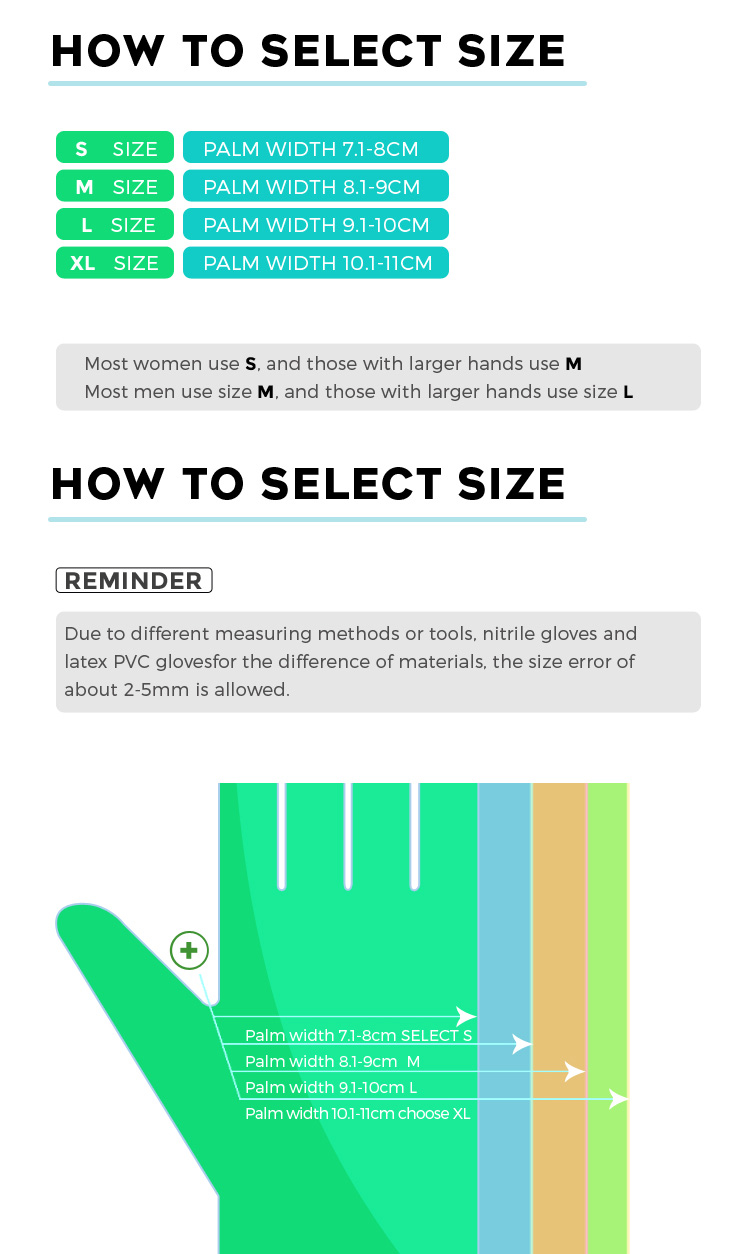Disposable Nitrile gloves Quality Standards(Non-medical):
Conforms to GB 4806.11-2016 and EN374 Standards
Nitrile is the most versatile material used in disposable gloves. It’s available in many thicknesses and is hypoallergenic, so it’s safe for those with a latex allergy.
Nitrile is resistant to most household chemicals and is not easily punctured or ripped. It’s safe to use in tasks that deal with sharp items, like cleaning up glass shards. Nitrile gloves are flexible, durable, and offer protection against bacteria and viruses.
Nitrile gloves come in a variety of colors that indicate their uses and protection levels. Blue nitrile gloves are a standard in the medical industry, for example, while black nitrile gloves are used in the automotive business.

Functional Benefits:
• Protection from unwanted or dangerous substances
• Beaded cuff makes donning easy and helps prevent roll back
• Superior strength with better puncture resistance
• Full textured enhances wet and dry grip
• Thinner gauge improved tactile sensitivity
• Custom design enhances comfort and fit
• Provide an alternative solution for individuals who are allergic to natural rubber latex
| Mil thickness | 3MIL | 4MIL | 5MIL | 6MIL |
| Grade | Medica/Food | Medica/Food | Industry/Food | Industry/Food |
| Material | Nitrile | Nitrile | Nitrile | Nitrile |
| Textured | Finger | Finger | Finger/Full | Finger/Full |
| Size | S-XL | Finger | Finger | Finger |
| Length | 230±10 mm | 230±10 mm | 230±10 mm | 230±10 mm |

Disposable nitrile gloves come in different thicknesses to cater to various applications. The thickness of nitrile gloves is typically measured in mils (one mil is equivalent to one-thousandth of an inch) or in grams per square meter (gsm). The most common thickness options for disposable nitrile gloves are:
When choosing disposable nitrile gloves, consider the following factors:
Application: Determine the specific tasks or activities for which you need the gloves and assess the associated risks. Different tasks require varying levels of protection and dexterity.
Required Protection: Consider the potential hazards, such as chemicals, sharp objects, or pathogens, that may be encountered during your activities. Select a glove thickness that offers adequate protection against those hazards.
Comfort and Fit: Ensure that the gloves fit properly and are comfortable to wear for extended periods. Gloves that are too tight can cause discomfort and reduce dexterity, while loose gloves may compromise safety and performance.
Quality and Certification: Look for gloves that meet relevant quality standards, such as those certified for medical or food handling purposes.
By considering these factors, you can choose the appropriate thickness and quality of disposable nitrile gloves that best suit your needs. It may be helpful to consult with a supplier or safety professional for further guidance based on your specific requirements.

 X
X